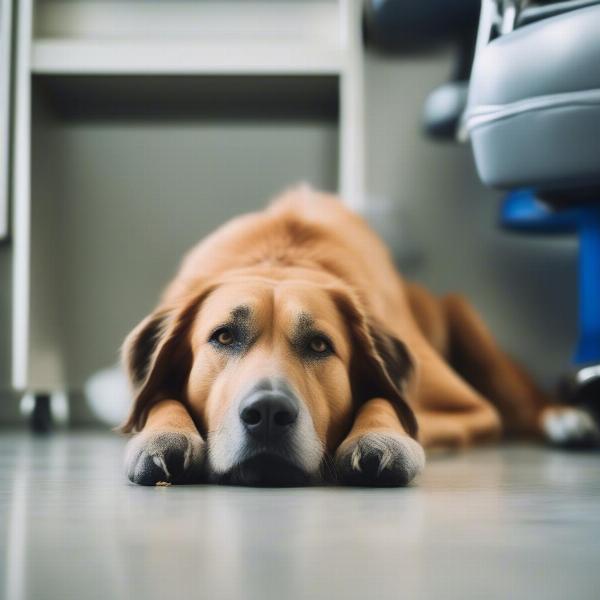If your senior dog is restless and panting more than usual, it’s natural to be concerned. While panting can be a normal response to heat or exercise, in older dogs, it can also signal underlying health issues. This article will delve into the various reasons why your senior dog might be exhibiting these symptoms and offer practical advice on how to address them.
Why is My Senior Dog Restless and Panting?
Several factors can contribute to restlessness and panting in older dogs. Some are relatively benign, while others indicate more serious conditions. It’s crucial to differentiate between these to ensure your furry friend receives appropriate care.
Pain and Discomfort
As dogs age, they become more susceptible to conditions like arthritis, hip dysplasia, and other joint problems. This can cause chronic pain, making them uncomfortable and restless, leading to increased panting.  Senior dog experiencing arthritis pain
Senior dog experiencing arthritis pain
Cognitive Dysfunction Syndrome (CDS)
Similar to Alzheimer’s in humans, CDS can cause confusion, anxiety, and changes in sleep patterns, leading to restlessness and panting, particularly at night. Dogs with CDS might pace, whine, and appear disoriented.
Heart and Lung Problems
Heart disease and respiratory issues can make it difficult for dogs to breathe comfortably, resulting in increased panting. They may also be restless due to the discomfort and difficulty breathing.
Anxiety and Stress
Older dogs can experience anxiety due to changes in their environment, routine, or household. This can manifest as restlessness and panting. Separation anxiety, noise phobias, and fear of thunderstorms are common triggers.
What Should I Do If My Senior Dog is Restless and Panting?
If your senior dog exhibits these symptoms, it’s essential to consult a veterinarian. They can perform a thorough examination to determine the underlying cause.
When is Restlessness and Panting an Emergency?
While some instances of restlessness and panting can be managed at home, certain situations warrant immediate veterinary attention:
- Rapid or Labored Breathing: If your dog is struggling to breathe or their panting is excessively rapid, seek emergency care immediately.
- Pale Gums: Pale or bluish gums can indicate poor circulation or oxygen deprivation, requiring urgent attention.
- Collapse or Weakness: If your dog collapses or becomes unusually weak, it’s a critical sign requiring immediate veterinary intervention.
- Excessive Drooling or Vomiting: These symptoms can accompany various serious conditions and should be addressed promptly.
Tips for Managing Restlessness and Panting in Senior Dogs
- Maintain a Comfortable Environment: Ensure your dog has a comfortable, quiet resting place, especially during stressful events like thunderstorms.
- Regular Exercise: Appropriate exercise can help manage pain and anxiety. Consult your veterinarian about suitable activities for your senior dog.
- Mental Stimulation: Provide mental enrichment through puzzle toys and interactive games to keep your dog engaged and reduce anxiety.
- Medications: Your veterinarian may prescribe medications to manage pain, anxiety, or underlying medical conditions.
Conclusion
Restlessness and panting in senior dogs can stem from various causes, ranging from minor discomfort to serious health problems. Early diagnosis and appropriate intervention are crucial for ensuring your dog’s well-being. If your senior dog displays these symptoms, consult your veterinarian for a thorough evaluation and personalized treatment plan. By understanding the underlying cause and taking proactive steps, you can help your beloved companion enjoy their golden years in comfort and peace.
FAQ
- Why is my old dog panting so much at night? Panting at night can be caused by pain, anxiety, CDS, or heart and lung problems. It’s important to consult your veterinarian to determine the cause.
- Is panting a sign of pain in dogs? Panting can be a sign of pain, especially if accompanied by other symptoms like restlessness, whining, or changes in behavior.
- How can I help my senior dog with anxiety? Creating a calm environment, providing regular exercise, and offering mental stimulation can help manage anxiety in senior dogs.
- What are the signs of cognitive dysfunction in dogs? Signs of CDS include disorientation, changes in sleep patterns, anxiety, house soiling, and decreased interaction with family members.
- When should I take my panting dog to the vet? If your dog’s panting is severe, rapid, accompanied by pale gums, collapse, or other concerning symptoms, seek immediate veterinary care.
- What can I give my dog for pain at home? Never give your dog human pain medication without consulting your veterinarian. Human pain relievers can be toxic to dogs.
- Can heat cause restlessness and panting in dogs? Yes, heat can cause panting, but excessive panting, even in cool environments, should be investigated by a veterinarian.
Related Articles on ILM Dog
- dog pacing at night panting
- best travel sickness tablets for dogs
- aktivait dog
- pink dog sweaters
- hoodie with dogs
About ILM Dog
ILM Dog is your go-to resource for expert advice on dog breeds, health, training, nutrition, grooming, and much more. We provide evidence-based information to help you make informed decisions about your dog’s care. From puppyhood to senior years, we offer practical tips and insights to enhance your bond with your canine companion. Contact us for personalized guidance on all aspects of dog care: Email: [email protected], Phone: +44 20-3965-8624.